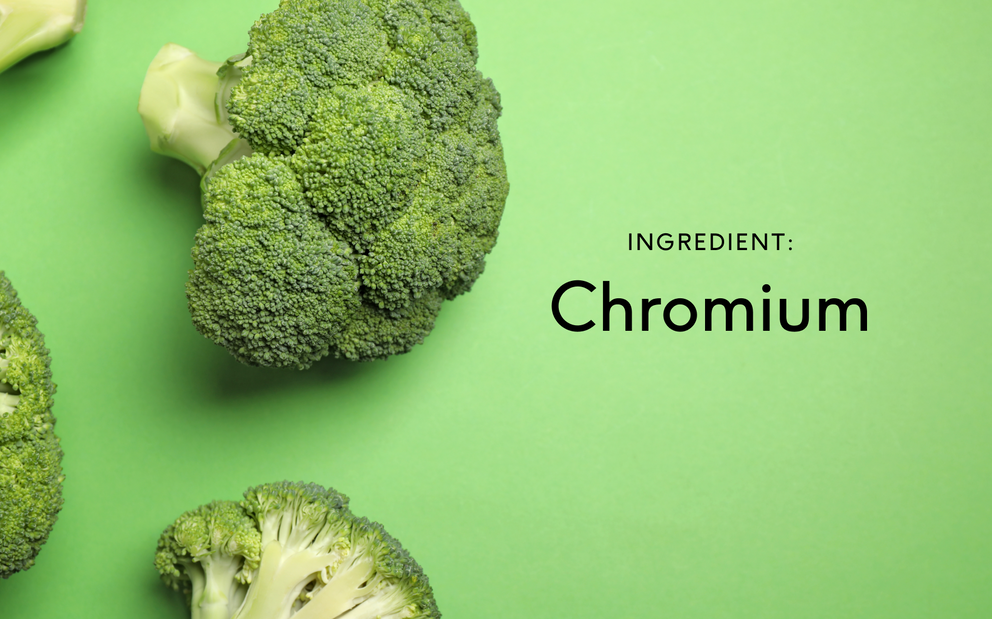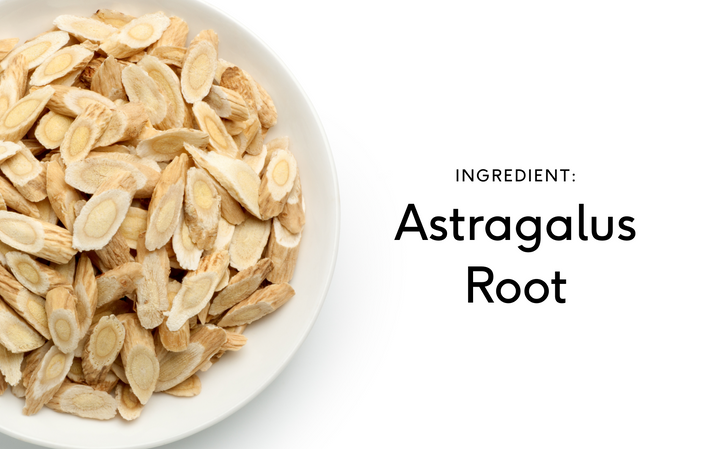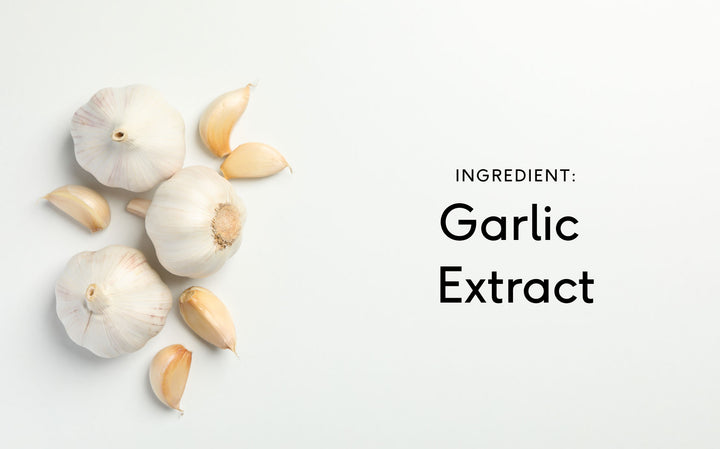Learn About Chromium in 5 Minutes
Table of contents

What is chromium?
Chromium is an essential mineral that is necessary for proper metabolism. This mineral appears to play a role in weight loss, blood sugar stabilisation, and optimum insulin production, and it seems to generally boost digestion and help with diabetes.
- Helps balance your blood sugar to prevent diabetes
- Normalises your metabolism to prevent unhealthy weight gain
- Reduces hunger and cravings for unhealthy food
- Helps you lose weight when you’re on a diet
Why we love chromium
Your body requires chromium in trace amounts, but this essential mineral is one of the most overlooked nutrients. While chromium is available from a variety of food sources, it’s easy to become deficient in this mineral if you don’t eat these types of foods frequently, and chromium deficiency can drastically increase your risk of developing diabetes.
While certain types of chromium are considered to be industrial waste because they are toxic, chromium picolinate is the good kind of chromium that’s found in food. When you don’t consume the types of foods that contain high levels of chromium, it’s necessary to take chromium in supplements, which is why we included this nutrient in our Feel Multivitamin™. If you have diabetes, taking chromium in supplement form may even stabilise your blood sugar levels and reduce your symptoms!
Unbelievable benefits of chromium
Over the years, scientists have discovered that chromium has a lot of benefits, which led to the recognition that this mineral is an essential nutrient. While chromium is one of the least-researched nutrients, it’s clear to see that this mineral has a wide variety of different benefits:
Metabolism Benefits
Chromium’s main effect appears to be the enhancement of the action of insulin in the body, which is a hormone that plays a vital role in regulating your metabolism. Essentially, your metabolism is the rate at which your body stores and uses carbohydrates and other types of food-derived energy, and when your metabolism is too high, you might have trouble maintaining a healthy weight, and you might suddenly become incredibly hungry for no apparent reason.
Supplementing with chromium appears to improve your body’s ability to regulate insulin, which, in turn, improves your blood sugar and normalises your metabolism. Improving your metabolism can lead to a wide variety of beneficial effects, and it appears that chromium plays a critical role in helping your body store and release the proper amounts of energy.
We've included 12μg of Chromium in Feel Meal Replacement, perfect for supporting every workout.
Blood Sugar Benefits
High blood sugar levels are associated with diabetes, and when the levels of glucose in your blood are too high, a variety of other negative effects can also occur. Research has shown that people who have high blood sugar respond better to chromium supplements, which seems to indicate that there’s a relationship between this essential mineral and your blood sugar levels.
Further research has confirmed that people who take chromium supplements are significantly less likely to develop diabetes. If you’re concerned that you might be at risk of diabetes or you’ve been observed to exhibit pre-diabetic symptoms, taking a supplement that contains chromium might be able to reverse the trend and improve your overall health and well-being.
Having balanced blood sugar throughout the night is important, as if your blood sugar levels drop too quickly or fall too low, this can wake you up and cause disrupted sleep. We've included 50μg of chromium in Feel Sleep to support you and your best night's sleep.
It’s important to note that not all studies into the subject have concluded that chromium reduces your blood sugar levels. It will be necessary to do more research to conclusively demonstrate the viability of chromium for this purpose.
Weight Loss Benefits
Taking chromium appears to reduce hunger and improve feelings of satiety, which leads to an overall decrease in food intake. If you’d like to shed a few extra pounds, therefore, taking chromium is a good idea, but remember that a healthy diet and exercise are also essential tools for attaining your ideal weight.
Supplementing with chromium appears to reduce episodes of binge eating and help with depression. Many of us choose to eat more than we should when we aren’t feeling good, and it seems that chromium helps keep those unhealthy impulses under control.
All of these factors seem to indicate that taking chromium might help you lose weight, but most of the studies that have been conducted to confirm this theory have been inconclusive. At the same time, however, not enough research has been done to determine the efficacy of chromium for weight loss one way or the other, and all the evidence seems to suggest that taking chromium reduces your urge to eat, which will naturally lead to a reduction in weight over time.
Is chromium water-soluble or fat-soluble?
Like all the essential minerals, chromium is insoluble or even toxic in its pure elemental form. When combined with various carrier substances, chromium has the potential to become fat-soluble. However, this mineral has very poor solubility in water even when it is ingested in a digestible form like chromium picolinate.
Where can chromium be found naturally?
Almost all foods contain chromium in some amount. In most cases, however, the concentrations of chromium in food are less than 2mcg per serving, which means it’s necessary to eat foods that are especially high in chromium to avoid deficiency in this essential nutrient. Vegans are even more at risk of becoming deficient in chromium. Examples of foods that contain high levels of chromium include meat, whole grain products, and certain vegetables.
5 foods/drinks containing chromium
1. Broccoli 9% DV per 1 cup or 64g
2. Grapes 7% DV per 1 cup, or 64g, or one medium-sized bunch
3. Whole wheat 3% DV per 85g
4. Garlic 3% DV per 1 tsp, 1/2g, or around 1/3 of 1 clove
5. Turkey breast 2% DV per 85g
What is the recommended daily value for chromium?
According to the National Health Service (NHS), “[a]round 25 micrograms of chromium a day should be enough for adults.” The figure established by the National Academy of Sciences in 1989 is about the same—this organisation recommends that babies consume around 5mcg of chromium per day, children consume 11-25mcg of chromium per day, and that adults consume around 35mcg of chromium per day. On average, adult females should consume around 5mcg less chromium than males according to the NAS.
What to consume to get a full daily dose of chromium?
Broccoli - around 10 cups or 640g
Grapes - around 14 cups
Whole wheat - around 2.72kg
Garlic - around 0.7 cup or 75g
Turkey breast - around 12.7kg
Can you absorb enough of chromium from food?
As you can see, it’s practically impossible to get all the chromium your body needs from food. While this nutrient is widely-dispersed throughout the food supply, it is available in such low quantities that it’s all too easy to become at least somewhat deficient in chromium. While full-blown chromium deficiency is rare, supplementation can help you counter the naturally low concentrations of essential chromium in most foods. Since your nutritional choices are limited, you’ll need to take chromium in supplements if you’re vegan.
Why is chromium necessary for your body?
The main purpose of chromium in the body appears to be the regulation of insulin, which is produced in the pancreas and controls the amount of glucose, or sugar, in your blood. Your body needs glucose to deliver energy to its various tissues, but proper disposal of glucose is just as important. If glucose stays in your body for too long, it can cause oxidative stress and contribute to the development of various degenerative tissue diseases.
Diabetes is, essentially, the body’s inability to properly process sugars, and chromium appears to boost the sugar-processing powers of the body by regulating insulin production. This single effect ripples outward to provide overall metabolic and digestive benefits that may improve your energy levels, help you lose weight, and improve your overall enjoyment of life.
Functions of chromium
Insulin production: Chromium helps your body regulate the production of insulin, which keeps the bodily levels of this hormone from becoming too high or too low.
Blood sugar regulation: Optimal insulin levels lead to blood sugar homeostasis, which is the state in which your blood sugar levels are in perfect balance.
Metabolic benefits: Regulating your insulin production also helps your metabolism in general, which may result in increased energy.
Diabetes reduction: Diabetic comorbid symptoms like neuropathy may be reduced with chromium supplementation.
Weight loss: Chromium also appears to be involved in food cravings, and supplementing with this essential nutrient may naturally attune your diet and help you lose weight.
Symptoms of chromium deficiency
Glucose tolerance
The symptoms of chromium deficiency closely mirror those of diabetes, but there are a few differences between these two conditions. When you become deficient in chromium, your glucose tolerance increases sharply, which means that your blood sugar levels rise and cause diabetes-like symptoms.
Peripheral neuropathy
Neuropathy in the peripheral parts of the body, such as the hands and feet, is one of the hallmarks of diabetes. Becoming deficient in chromium can initiate this condition, and it can also worsen the peripheral neuropathy suffered by diabetics.
Cognitive decline
Chromium deficiency can cause “brain fog,” confusion, or general mental decline. These effects are caused by cellular death in the brain spurred by dangerously high blood sugar levels.
How long do you need to take chromium to start experiencing its benefits?
Chromium is a fat-soluble nutrient, which means that it takes your body a long time to properly process this essential mineral. Your body only needs tiny amounts of chromium for healthy function, but it can take from a few days to a week to experience any benefits.
Consistency is key and our research recommends taking your Feel supplements for at least 3 months to allow your body to adjust and provide the desired benefits.
How long does it take for your body to digest/absorb chromium?
Chromium picolinate has the best bioavailability of any of the types of chromium supplements on the market, but even so, your body takes quite a while to absorb the chromium you eat. No concrete data are available on the absorption rates of chromium picolinate, but some estimates suggest that less than 1% of the chromium you consume is used. This is to be expected, however, and we counter for this low bioavailability in our Feel Multivitamin™.
How long does chromium stay in your body after you take it?
Chromium builds up in the body, and it takes a long time for this essential mineral to be used and excreted. At the same time, however, it’s still necessary to constantly consume chromium to make up for the molecules of this element that your body uses.
Is chromium an antioxidant?
Some studies show that chromium might have antioxidant properties, but there are no concrete data at this time.
Can you overdose on chromium? What are the effects?
It’s practically impossible to overdose on chromium in food. Overdosing on chromium supplements, however, could cause severe organ damage. That’s why we stick to your RDV of chromium in our Feel Multivitamin™.
Does chromium dissolve, flush out, or build up in the body?
Chromium builds up in the body and stays there for quite some time until it is used.
Can you take chromium during a diet?
Taking chromium shouldn’t interfere with any dietary considerations. In fact, taking this supplement should improve your metabolism and help you with your nutritional goals.
Are there synthetic forms of chromium?
Since chromium is a metal, it is hard to synthesise. To make chromium bioavailable, however, it is necessary to bond this metal with certain lab-derived substances.
Why might synthetic forms of chromium be better?
Synthetic chromium would only be desirable if the Earth’s elemental chromium stores ran dry.
Absorption rate of synthetic chromium
It’s possible that the future’s scientific breakthroughs will be able to make a more bioavailable form of chromium that has at least some synthetic components.
Why might natural forms of chromium be better?
Natural chromium is the only form of this essential mineral available on the market.
How to take chromium
Chromium can be ingested in an oral supplement or consumed in food. People with dietary restrictions should take chromium in supplements to make sure they don’t become deficient.
Chromium trends in medicine
Recently, a Chinese study looked at correlations between chromium deficiency and diabetic and pre-diabetic symptoms. It found that “potential role of Cr and Fe in diabetes should receive attention,” which means that there’s evidence suggesting that becoming deficient in chromium could cause diabetes.
Why everyone should be taking Feel Multivitamin™
With our latest version of Feel Multivitamin™, we’ve added tons of amazing new ingredients we’ve found along the journey to becoming one of the world’s top supplement brands. Chromium is one of them, and the addition of this essential mineral in its most bioavailable form makes finding that monthly package from WeAreFeel on your doorstep that much sweeter.
Here’s the Proof
- The influence of chromium chloride-containing milk to glycemic control of patients with type 2 diabetes mellitus: a randomised, double-blind, placebo-controlled trial.
- Characterisation of the metabolic and physiologic response to chromium supplementation in subjects with type 2 diabetes mellitus.
- Risk of Type 2 Diabetes Is Lower in US Adults Taking Chromium-Containing Supplements.
- Effects of chromium picolinate on food intake and satiety.
- A Double-blind, Randomised Pilot Trial of Chromium Picolinate for Binge Eating Disorder: Results of the Binge Eating and Chromium (BEACh) Study
- Chromium picolinate supplementation for overweight or obese adults.










































 Back
Back





